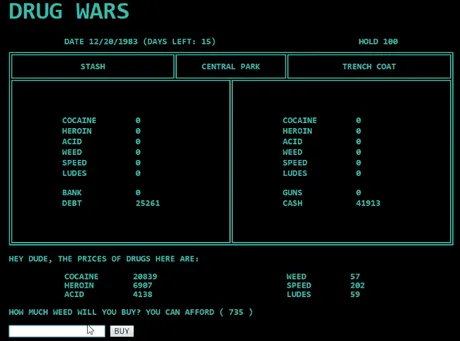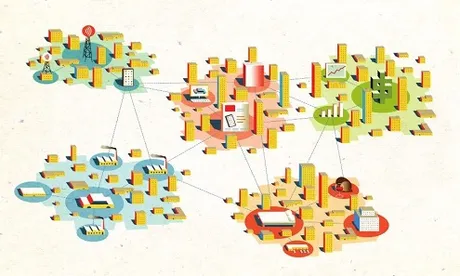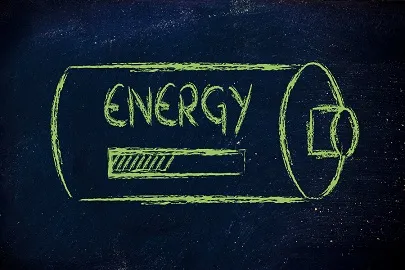
Prerequisite
A few days ago I bought up the idea of Captchain; a CAPTCHA based platform that would be used to secure the digital scarcity of assets created on the Steem blockchain. Using a platform like Captchain, we would theoretically be able to create artificially scarce products while playing video/text games on the blockchain without having to sacrifice Steem in the process. Instead of buring Steem we'd be burning time and brain power in order to solve the puzzle. Silk Boulevard is my first proof-of-concept game that would be connected to this service.

I never actually played the above version of Drug Wars. There was a brief time in high school that kids were playing a version that had been adapted to graphing calculators (shown right). We got a kick out of pretending to do math while we were really selling fake drugs inside a basic simulation.
Idea
Regardless, I believe a game like this could easily be adapted to the Steem blockchain. However, instead of a turn-based single-player game it would be a block-based multiplayer game. The Steem API would be doing quite a bit of the heavy lifting. A project like this would have very low overhead for a game that could potentially accommodate thousands of players. In addition, the assets created in-game would be provably scarce and have some kind of (likely low) value.
Introduction
You've fallen on hard times and only have $100 in your pocket. You begin the game living in your mom's basement. Inventory is very limited in the beginning. You can't run any kind of meaningful operation from Mom's House, and if she catches you she'll throw away your stash and get wise to your schemes! The goal of the game is to make money and establish a more suitable base of operations.
The first thing you'll have to do is acquire some drugs and canvas for customers. This can be done in a variety of ways. Starting out, it may be worth it borrow from a loan shark or have the drugs fronted to you. This is a risky action that will get you into trouble if you overextend your position, but if you know what you're doing you'll progress faster.
Energy
In the beginning you don't have a car so traveling around is more difficult. Every action costs a certain amount of energy. From travel and canvasing to growing and selling. When that energy runs out the account has to complete a CAPTCHA puzzle to regenerate.
This could be anything from math word problems to games of Tetris. However, considering the context of the game and the fact that most people hate math I was thinking about something more along the lines of a connect three game such as the one shown to the right. It doesn't make perfect sense but if it keeps bots out long enough to develop other solutions it will do just fine.
This mechanic should increase scarcity of every aspect of the game. Not only would a bot have to be programmed to play the game itself, it would also have to adapt to every minigame CAPTCHA that was thrown in the mix. In addition, there should be no incentive to have multiple accounts. Even the process of creating a new character should be an expensive operation with high overhead cost. Accounts with a history of playing the game will be able to attain discounts that lower these costs through the process of leveling up.
Hardcore mode
I want the stakes of this game to be very high. You can get sent to prison. You can die, permanently. This is really the only way the game makes sense. I want there to be dealers, suppliers, producers, drug lords, and cops. Anyone can be a dealer, but there have to be enough dealers in an area for suppliers to become profitable. Drug lords (suppliers of suppliers) will only be possible once there are enough suppliers.
Each level up the chain increases risk/reward by huge margins. The game won't work if everyone is running around trying to be a drug lord. Some players will make the safe play and others will risk it all to shoot the moon.
Scarcity and Resource Sinks
Part of keeping the game high stakes is maintaining scarcity. If a bot can get robbed or killed players are much less likely to try and cheat. Also, when a player dies all their resources are lost. The only way to avoid these losses will be to exchange assets for an in-game crypto. An extremely rudimentary DEX should allow the transfer of basic resources between accounts.
In addition to all this there will also be a myriad of resource sink holes that players can spend their money on. From paying off dirty cops to buying a car and other property, players will have many expenses to keep all resources in high demand. Drugs will also have a lifespan. For example, if you are a street dealer there is no way to buy 10 pounds of weed in bulk for an amazing deal. You would never be able to sell it all before it goes bad. This will prevent resources from being stockpiled. Product has to move in a timely manner to become profitable.
RNG
Random occurrences are created by hashing the blocks from Steem witnesses. A single SHA-256 hash is the equivalent of rolling 64 D16 dice. I assume this will be more than enough RNG for single operations, but if not it won't be hard to reroll in a provably verifiable way.
This puts trust in the witnesses for them to not cheat at the game, but honestly I'm not even sure how many witnesses even have the technical knowledge to pull off such a thing. In addition, cheating would be fairly obvious as certain accounts would get extremely lucky during blocks produced by certain witnesses. I have to assume that witnesses would not risk their position of power to cheat at my Podunk game. In the event of such corruption, we could hash multiple blocks for RNG and even consider hashing the blocks of other blockchains combined with our own.
cops
I'm struggling to brainstorm how to incorporate human players as police, but the idea is that you can choose to be a dirty cop and offer protections from the law and skim off the top of busts to earn resources and level up. The logistics of this dynamic are complicated to say the least. I've been thinking about a resource for police called "honor". Dirty cops with low honor points would have more of a chance of getting caught and sent to prison.
The big problem with players as police is that I'm not sure how to incorporate privacy into the game. Everything is on the blockchain for everyone to see. It either might be much too complex to incorporate or the mechanics of busting dealers needs to be very luck-based.
For example, if a dealer's contact list is transparent on the blockchain everyone would be able to see when someone in that dealer's contact list wanted to buy. Cops would know every detail of a deal before it even happened. The logistics of maintaining private transactions while also being able to verify those transactions were legitimate is not a trivial process.
Map
It would be nice if a game of this nature could scale dynamically. Ideally, I'd like it to be possible for someone to play by themselves or with thousands of other people. This would require a playing area of massive scale while at the same time creating a network effect for those that choose to play in the same area.
I was thinking about using the Google Maps API to showcase just how much our privacy is being violated :D. By using Google Maps as a template, the playing board would be the entire world, and if the game became popular enough it could go mobile and players would be running around doing fake drug deals in an altered reality (similar to Pokemon Go).
Did you ever play Ms. Pacman on Google Maps? It's the same idea. I think it would be very easy to overlay an auto-generated map on top of it.
There are also additional APIs out there that will show real-life property values. This tech could be used to establish supply and demand for drug markets. For example, crack/meth might have little demand in an area with million dollar houses, but cocaine/ecstasy might be a different story. Marijuana might have good demand everywhere but the ability to generate revenue from it may pale in comparison to other options.
Random events
Using the businesses listed directly on Google Maps, random events could pop up from time to time. For example, during a sporting event or concert it might be easier to sell in that area. Of course, this also makes it a honeypot for police.
Basic Economy
Because digital drugs have no actual demand, nearly all demand will be artificially generated though non-player characters. The supply of in-game USD can only grow from the outcome of a successful drug deal to an NPC. This is the bottom of the pyramid, and money flows up.
Every dealer will have a Black Book (contact list) of clients. In order to find NPC clients dealers will have to canvas an area (basically a dice roll) and hope to get lucky. Depending how much time (blocks) an NPC has gone without purchasing drugs combined with chance (SHA-256 dice rolling) clients go from red (not looking to buy) to green (looking to buy). If demand is met consistently dealers can establish loyalty with their clients for repeat business.

Clustering solutions
High concentrations of people (cities) with high property values have the greatest demand for product. However, it is also difficult to buy/produce/farm in these areas as those activities are more expensive and risky. The world map (literally the real world using Google Maps) is massive. A series of supply/demand incentives ensure that dealers will group in the same areas so that everyone isn't running around in their own city playing the game by themselves.
Supply/Demand
In cities that no one is playing in (supply zero) demand is also low. It's much harder to canvas and sell to NPCs in areas that no one else is in. Supply will be determined by an average over time. For example, if it takes an average of 30 blocks to do one drug deal and an area made 1000 drug deals in the last 10,000 blocks the supply rate would be 3.0 because a deal is going down once every 10 blocks and it would take three dealers on average to accomplish this.
s = a / t * d s = supply rate a = average time to make a deal t = total time evaluated (blocks) d = deals made during total time

Three demand equations
While supply rate is low demand will also be very low. As more players enter the area demand will increase polynomially (y = x^2) or exponentially (y = 2^x). Once supply gets to a certain rate it will become linear (y = x). Then once an area has too much activity demand will plateau using a logarithmic function (opposite of exponent).
This dynamic will create a "sweet spot" of activity in any given city where players choose to play. It will encourage players to cluster up, allowing the world map to be massive (and mostly unused). At the same time if one area becomes bloated with activity there will be incentive to go elsewhere. Players can choose to play in an overcrowded city (they might have friends there) but doing so will yield increased competition/risk and diminishing returns.

Depression
In addition to an energy-bar I'm also thinking about a depression bar. The more depressed you are, the more energy operations cost. Getting high off your own supply can lower depression and increase energy efficiency, but it can also lead to addiction and not be worth cost. This leads to other possibilities like going to rehab and interventions.
Achievements and Account leveling
While individual characters can be jailed and killed, accounts are immortal. Upgrades to accounts are usually permanent. Examples of upgrading an account would be paying $10,000 USD to allow creation of new characters to cost 100 less energy; paying $20,000 to increase starting inventory slots by +1; paying $5,000 to increase energy production by 8%; etc.
These upgrades would stack, but have diminishing returns of an exponential or logarithmic nature. The cost would either be exponential or the benefit would be logarithmic. For example, if you payed $20,000 to increase inventory by one the next level would be $40,000, then $80,000, $160,000, etc. Paying $5,000 to increase energy production could cost $5,000 each level, but the benefit could decrease from 8% to 4% to 2% etc, halving each time. These diminishing returns will create a situation where upgrading is not financially profitable, but many players will choose to purchase them regardless for achievements or simply because they are completionists (increasing scarcity).
Achievements can also grant bonuses. For example, never getting high to decrease one's depression would be an achievement, while on the other side of the spectrum being a semi-functional heroin addict would also be difficult to achieve. Completing achievements would either unlock certain options in game or provide some kind of small account bonus.
Conclusion
This is the basic idea I have for the game, but there will likely be many more complexities and problems to solve. The main objectives of the game are to provide a proof-of-concept of creating scarce digital assets that have value and to ensure the ownership of those assets belongs to the community at large rather than the developers working on the project.
Naming significance
Bitcoin gained a lot of infamy from Silk Road, the dark-net drug delivery service. Silk Road 3.0 is still up and running. Decentralization can not be stopped it seems. I thought a tribute to our not-so humble beginnings should be recognized.
Open-source ideas can't be stolen.
The paradigm-shift is upon us. This idea, no matter how good or bad, cannot be stolen. I would like nothing more than for someone else to save me the trouble and bring this vision to life. You'll notice that's not going to happen, because products like this don't reward the developers. The best ideas in the cryptosphere are going to be ones that are fully decentralized and owned by the community. Eventually, any good project that does not fit this model will be forked/cloned until it does.
Text games are being reborn
The inefficiency of distributed ledger technology is forcing us to start back at the bottom and scale our way up from there. Just like video games started out as text thirty years ago, so will truly decentralized blockchain-games start out the same way. We are at the ground floor of an incredible movement.

Scaling
Just like cryptocurrency has a way of bootstrapping itself and funding its own development, so too can a blockchain-game. At first, games like this will just be text-based with little to no graphical interface. However, if the mechanics of the game and the decentralized ownership of the assets created within show merit, the game should fund its own development.
For example, I could easily create the connect-3 CAPTCHA game with zero graphics. The transitions between moves would be extremely jarring and unappealing. However, I could create a bounty for another developer to add some flare to it. Instead of funding for the development myself it would be funded by the community. Anyone would be able to donate to the development fund. Free-lance programmers would be able to bid on the contract, and if their bid was successful and they delivered a suitable solution they would be allowed to collect the bounty. This bounty could consist of Steem, custom-tokens, and even in-game resources.
I believe that tactics like this will allow "garbage" games programmed by as few as a single programmer to scale into something much more impressive. Developers need decentralized consensus constructs like this in order to come together and start building bigger projects.
Final Conclusion
If a cryptokitty can sell for $20k why are we sitting on our hands while staring at a completely untapped gold mine?
Players have never owned the game they play. The cryptosphere has the unique opportunity to decentralize ownership to the community and cut out the greedy middle man.
What are we waiting for?
Return from Silk Boulevard to edicted's Web3 Blog
